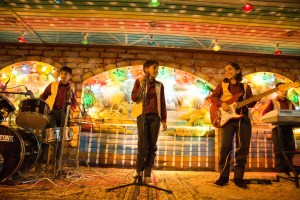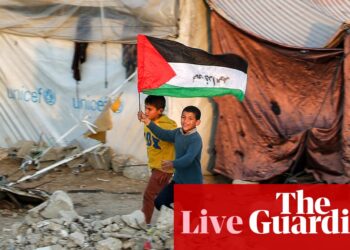EXCLUSIVE: Director Hany Abu-Assad, two of whose films have been Oscar-nominated, is sitting in the booth of the Palestine Filmlab at the El Gouna Film Festival in late October.
Amid the hubbub of the open-air festival plaza, Egyptian star Youssra walks past surrounded by youngsters yielding smart phones. An influencer rolls out a mini red carpet, films the actress gliding over it, and the gaggle moves on.
Abu-Assad is not involved in the activities of the Palestine Filmlab, but with the people overseeing the stand for the Ramallah-based talent and project incubator gone for the day, it felt like a relatively quiet place to conduct an impromptu interview.
The Palestinian-Dutch filmmaker was in El Gouna to participate in his first public onstage conversation in nearly four years.
Over two hours, he discussed his trajectory from Nazareth to the Netherlands back to the West Bank and then onto Hollywood, and filmography spanning Ford Transit (2003), Paradise Now (2005), The Courier (2012), Omar (2013), The Idol (2015), Idris Elba and Kate Winslet starrer The Mountain Between Us (2017) and Huda’s Salon (2021). Both Paradise Now and Omar were Oscar-nominated.
As we talk, Egyptian festival goers wander up from time to time to ask for information on Palestinian cinema unaware they are speaking to one of its greatest directors. “It’s closed,” says an apologetic Abu-Assad, who has not shot a film since Bethlehem thriller Huda’s Salon and has no immediate plans to get back into the director’s chair.
He is consumed instead by the ongoing humanitarian crisis in Gaza sparked by Israel’s year-long military operation, which in turn is in response to Hamas’s October 7 attacks on southern Israel which killed more than 1,100 people and resulted in 253 people being abducted.
A year on, more than 43,000 people have been killed in the densely populated Gaza strip and another 104,000 wounded, while world aid agencies are warning that the 2.1M population is at risk of famine due to Israeli restrictions on food supplies.
“I don’t know a single Palestinian who has not lost somebody in Gaza,” says Abu-Assad, bringing up the case of Qais Attaallah, the young star of his 2015 Gaza-set drama The Idol, who lost 48 members of his family on his mother’s side in an Israeli airstrike in November 2023.

Qais Attaalah (centre) in The Idol.
©Adopt Films/courtesy Everett Collection
“His entire family has been wiped out. He lost his grandparents, uncles, aunts and their children. When the war started, they left Gaza City for a villa, thinking they would be safe. They had nothing to do with Hamas,” says Abu-Assad.
In his on-stage conversation, Abu-Assad was uncharacteristically publicly scathing of the West and its leaders and their lack of condemnation and action over the situation in Gaza, saying the “the masks are off” in terms of the different attitudes towards the wellbeing of the Palestinian people.
Talking afterwards, he says that nothing has changed in his rhetoric, but rather the world has changed in its attitude to Palestinians.
“I’ve always been against colonization… but I’ve always been happy to hear the other point of view,” says Abu-Assad. “I’m saying the same thing as always. I haven’t changed but I’ve had so many interviews cancelled because it doesn’t fit with what editor-in-chiefs want to hear.”
“I’m still pro-freedom of speech, pro-equal rights, pro-liberal democracy. 99% of the people in the West want the same as me but when I say I want equal rights, I am told, ‘You want to destroy Israel’,” he continues. “If equal rights for Palestinians means the destruction of Israel, that means there is something wrong with Israel.
“I am human where I believe every human being is equal and there should be justice and rule of the law… Does mean that I am extreme, that I want to kill the Jews. Are you kidding me. I appreciate them. There are so many Jewish people speaking against Zionism.”
Questioned on the ferocious violence of Hamas’s actions on October 7, which have been defined as atrocities by NGO groups such as Human Rights Watch (which has also since condemned Israel’s military operation in Gaza), Abu-Assad bats back against generalizing about Palestinians as a people.
“Of course, we have fighters, people who will use violence, but in general Palestinians don’t like violence, which is why most of us are still watching from the sidelines as these horrible crimes against our people take place.”
“We are not one people, don’t make collective judgements, in the same way I’m not making a collective judgement about the Israelis. With all these crimes, I still think there is a place for Jews but there is no place for occupation, discrimination, for apartheid,” he continues. “We can’t continue with this system. Yes, there is a place for the Jews, but there is no place for supremacy.”
Abu-Assad speaks Hebrew – having grown up in Nazareth, which is a Palestinian city lying within Israel’s 1948 borders – and forged ties with Israelis prior to the breakdown in relations in the wake of the failure of the Oslo Accords in the early 2000s. Surprisingly, amid the violence and killing, he suggests the only forward in the long run will be for both sides to learn to live together with equal rights.
“Germany and France, how many times did they go to war? We been fighting for 75 years but we have to live together with equal rights – there is no other choice, and the ones who can’t stand being equal to Palestinians what can I say to them? There are Palestinians who don’t want to live with Israelis… but I can say one thing, most people don’t care about any of this, as long as you’re a law-abiding citizen, a good neighbor, but we have to stop these politicians who misuse fear and sentiment, to cancel the other.”
Beyond the creatively paralyzing impact of the situation in Gaza, Abu-Assad’s current hiatus comes after a bruising professional period, starting with Huda’s Salon.

Maisa Abd Elhadi in Huda’s Salon
© IFC Films / courtesy Everett Collection
The Bethlehem-set thriller, about a hairdresser who blackmails female clients into becoming Israeli informers by fabricating sexually compromising images of them, met with disapproval from the Palestinian Ministry of Culture for its depiction of rotten elements of Palestinian society, while a nude scene also caused controversy.
Around the same time, Abu-Assad also found himself caught in a storm around Egyptian director Mohammed Diab’s West Bank-set drama Amira, on which he was a producer. The tale of a girl who believes she was conceived from the smuggled sperm of an imprisoned Palestinian freedom fighter, sparked outrage for its twist in which she discovers her biological father is Israeli.
Jordan was forced to drop the film as its 2022 Oscar entry and the producers pulled the film from a Red Sea Film Festival Screening, after the families of Palestinian prisoners and children conceived with smuggled sperm blasted the drama for being insensitive.
In response to a question from the floor during the conversation, Abu-Assad suggested he embraces the controversy provoked by both films.
“It’s important to tackle thorny or controversial topics, and if some people get angry that’s ok. Making a movie that angers society isn’t necessarily a bad thing,” he told the young audience. “If people decide not to interview me, or release the film, or ban the film, so be it… that’s not my motivation. I am against bans and taboos, that’s a sign of weakness. The stronger the society, the more accepting it is of controversy.”
In a further setback, the director also parted company with Netflix on $12M series Kings’ Wives, set in a Middle Eastern kingdom, after the platform asked him to depoliticize the screenplay. It reportedly felt the drama was too close to real-life, contemporary power structures in the region where it was trying to make inroads.
A project with TriStar Pictures to direct an adaptation of the popular comic book Infidel, about an American Muslim woman and her multi-racial neighbors who move into a building haunted by entities that feed off xenophobia, also fell through.
Reflecting on these failed projects, Abu-Assad suggested the film industry in the Middle East and North Africa needed to be thinking about other ways of financing its productions, not reliant on the West.
“We need a kind of BRICS for Arab filmmakers,” he told the conversation, referring to the intergovernmental investment bloc bringing together Brazil, Russia, India, China, South Africa, Iran, Egypt, Ethiopia and the United Arab Emirates.
Abu-Assad says he has ideas for future features but that he is struggling to distil them with the current situation in Gaza.
“At the moment, I am feeling a bit confused. I want to see first where the world is going. I believe this world belongs to the past. The current system is corrupt, not just in terms of Palestine, but in terms of issues such as the future of democracy, the environment and even A.I. No-one knows where it is all going… I want to make a story capturing his moment, of this falling of the past, but it’s taking time to find, because I’m also living in that moment.”






